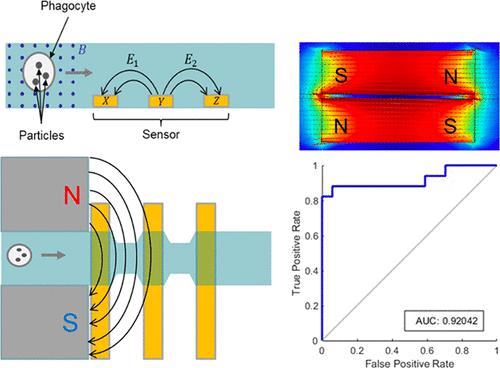Our official English website, www.x-mol.net, welcomes your feedback! (Note: you will need to create a separate account there.)
Bioelectronic Sensor with Magnetic Modulation to Quantify Phagocytic Activity of Blood Cells Employing Machine Learning
ACS Sensors ( IF 8.9 ) Pub Date : 2022-06-16 , DOI: 10.1021/acssensors.2c00706 Corey Norton 1 , Umer Hassan 1, 2
ACS Sensors ( IF 8.9 ) Pub Date : 2022-06-16 , DOI: 10.1021/acssensors.2c00706 Corey Norton 1 , Umer Hassan 1, 2
Affiliation

|
Microbial infections result in activating an immune response in the human body, which triggers inflammatory pathways resulting in recognition and subsequent killing of the pathogens. Quantifying the blood cells’ natural ability to kill pathogens, i.e., phagocytosis, is critical to demonstrating the effectiveness of an individual’s response in combating pathogens. Current laboratory processes and equipment that can be used to monitor phagocytic activity are costly and time-consuming and require significant technical expertise to run such assays. Here, we design and develop a novel biosensing platform capable of quantifying the phagocytic ability of blood cells. The sensor design is composed of electronic sensing and magnetic modulation sub-systems that work in conjunction to monitor phagocytic activity in microfluidic channels. The phagocytes internalize the IgG-coated magnetic beads, and when infused into the sensor, their speed will be modulated using the quadrupole magnetic field configuration as they pass through microfluidic channels where microfabricated electrodes are placed. The electronic sensor will generate the voltage pulse for each passage of the phagocyte, whose distinct features are correlative to the phagocytic activity. We experimentally tested this device using 17 blood samples collected from patients at Robert Wood Johnson Medical Hospital. Further, we developed artificial neural networks (ANN) to improve the accuracy of the phagocytic activity detection. ANN model detected the phagocytic activity with 88.2% accuracy. This novel sensing platform can potentially be used to triage high risk patients and develop personalized theranostics for the septic patients in the future.
中文翻译:

利用机器学习量化血细胞吞噬活性的磁调制生物电子传感器
微生物感染导致激活人体内的免疫反应,从而触发炎症通路,从而识别并随后杀死病原体。量化血细胞杀死病原体的自然能力,即吞噬作用,对于证明个体对抗病原体反应的有效性至关重要。当前可用于监测吞噬活动的实验室流程和设备既昂贵又耗时,并且需要大量的技术专业知识来运行此类检测。在这里,我们设计和开发了一种能够量化血细胞吞噬能力的新型生物传感平台。传感器设计由电子传感和磁调制子系统组成,它们协同工作以监测微流体通道中的吞噬活动。吞噬细胞将涂有 IgG 的磁珠内化,当注入传感器时,它们的速度将在它们通过微流控通道时使用四极磁场配置进行调节,微流控通道放置微制造电极。电子传感器将为吞噬细胞的每次通道产生电压脉冲,其独特的特征与吞噬细胞的活性相关。我们使用从罗伯特伍德约翰逊医院的患者身上采集的 17 份血液样本对该设备进行了实验性测试。此外,我们开发了人工神经网络(ANN)来提高吞噬活动检测的准确性。ANN模型以88.2%的准确率检测到吞噬活性。
更新日期:2022-06-16
中文翻译:

利用机器学习量化血细胞吞噬活性的磁调制生物电子传感器
微生物感染导致激活人体内的免疫反应,从而触发炎症通路,从而识别并随后杀死病原体。量化血细胞杀死病原体的自然能力,即吞噬作用,对于证明个体对抗病原体反应的有效性至关重要。当前可用于监测吞噬活动的实验室流程和设备既昂贵又耗时,并且需要大量的技术专业知识来运行此类检测。在这里,我们设计和开发了一种能够量化血细胞吞噬能力的新型生物传感平台。传感器设计由电子传感和磁调制子系统组成,它们协同工作以监测微流体通道中的吞噬活动。吞噬细胞将涂有 IgG 的磁珠内化,当注入传感器时,它们的速度将在它们通过微流控通道时使用四极磁场配置进行调节,微流控通道放置微制造电极。电子传感器将为吞噬细胞的每次通道产生电压脉冲,其独特的特征与吞噬细胞的活性相关。我们使用从罗伯特伍德约翰逊医院的患者身上采集的 17 份血液样本对该设备进行了实验性测试。此外,我们开发了人工神经网络(ANN)来提高吞噬活动检测的准确性。ANN模型以88.2%的准确率检测到吞噬活性。

























 京公网安备 11010802027423号
京公网安备 11010802027423号